|
|
|
Sort Order |
|
|
|
Items / Page
|
|
|
|
|
|
|
| Srl | Item |
| 1 |
ID:
089262
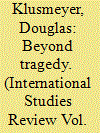

|
|
|
|
|
| Publication |
2009.
|
| Summary/Abstract |
Hans Morgenthau claimed that a tragic perspective enables us to confront more squarely the harsh realities of politics, the evil aspects of human nature, and the ethical compromises action requires. Richard Lebow has more recently identified Morgenthau as an exemplar in making his own case for the "tragic vision." This essay contrasts the sharp differences between Morgenthau's and Hannah Arendt's response to the Holocaust to challenge Morgenthau's claim, and to illustrate the limitations of a tragic perspective. Her turn to law in confronting the problems of evil and responsibility that the Holocaust had so radically posed underscores the need to draw upon other conceptual resources beyond tragedy in our critical engagement with such issues.
|
|
|
|
|
|
|
|
|
|
|
|
|
|
|
|
| 2 |
ID:
113747
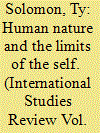

|
|
|
|
|
| Publication |
2012.
|
| Summary/Abstract |
International Relations (IR) has seen renewed interest in the nuanced insights of Hans Morgenthau which had long been obscured by neorealism. This new "reflexive realism," however, far from exhausts the range of Morgenthau's thinking about politics or social theory. In the 1960s, Morgenthau lamented the inability of modern thinking to recognize the connections between power and love, which he argued was symptomatic of the inability to fully understand either one. For Morgenthau, both power and love were rooted in the need to overcome the loneliness of the human condition. Through pursuits of both power and love, people seek, through others, to avoid the self's insufficiency. Yet, these pursuits are mutually subversive. The frustration of love blends into the imposition of power, and the pursuit of power is ultimately an extension of the search for love. In exploring these issues, this paper argues that Morgenthau's insights have implications for at least three core issues of contemporary concern in IR. First, they suggest fresh perspectives on recent discussions of human nature in IR. Second, Morgenthau's analysis contributes to the burgeoning interest in emotions in IR, pointing to the neglect of love in this literature, and illustrates his attempt to theorize what may be called the affective limits of the self. Third, these insights can be used to enrich recent discussions of realist constructivism in IR.
|
|
|
|
|
|
|
|
|
|
|
|
|
|
|
|
| 3 |
ID:
106423
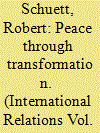

|
|
|
|
|
| Publication |
2011.
|
| Summary/Abstract |
Transformationalist thinking is plentiful. The Iraq invasion is the latest example of its failure. Is international political reality destined to be the 'realm of recurrence and repetition'? This article delineates a political theory of moderate progress found in Hans Morgenthau's political realism (Realism). Realism recognises the potentiality of transforming international relations, but, warned by its political anthropology, it envisions a distinct philosophy of politics as an effective means for achieving peace. It makes the case for a foreign policy of national security and humility, believing in progress by other means. Based on a renewed engagement with its concepts of the state, national interest and national security, Realism is shown to be critical and progressivist, restrained and realistic. Its nature and structure makes it intellectually incompatible with conservative organicist projects; nor is it reconcilable with radical critical agendas. In search for allies, Realism shows a potential affinity to a moderately Leftist politics and foreign policy.
|
|
|
|
|
|
|
|
|
|
|
|
|
|
|
|
| 4 |
ID:
119272
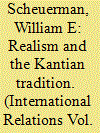

|
|
|
|
|
| Publication |
2012.
|
| Summary/Abstract |
In contemporary international political theory, 'Cosmopolitanism' is typically juxtaposed to 'Realism', with many varieties of the former building on Kantian moral and political ideals, and the latter presumably rejecting Kant and his aspiration for far-reaching global reform. In agreement with a growing body of scholarship that seeks to challenge conventional views of Realism, this essay attends to the surprisingly complex views of the Kantian legacy (including Hans Kelsen, perhaps the most important neo-Kantian international thinker in the last century) within its ranks. Not all Realists have been unambiguously critical of Kant, and when in fact they have criticized him, they have done so for many different reasons. First-generation Realists (e.g. E. H. Carr, John Herz, Hans Morgenthau, Reinhold Niebuhr, Frederick Schuman and Georg Schwarzenberger) offered an ambivalent reading of Kantianism consistent with their endorsement of the ultimate desirability of major alterations to the global status quo, whereas second-generation Realists (i.e. Henry Kissinger and Kenneth Waltz) tended to read Kant so as to transform him into a forerunner of their own anti-reformist and institutionally conservative versions of Realism. An examination of Realism's rendezvous with Kantianism not only helps draw a more differentiated portrayal of Realism than is still found in much scholarship, but it also helps us understand how Realism dramatically changed within a relatively short space of time during the immediate postwar decades. It also points to some important potential starting points for a more fruitful exchange between Cosmopolitans and Realists.
|
|
|
|
|
|
|
|
|
|
|
|
|
|
|
|
| 5 |
ID:
145675
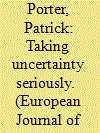

|
|
|
|
|
| Summary/Abstract |
If we can’t reliably predict the future, how can we be wise when preparing for it? Examining the UK’s ‘Strategic Defence and Security Review’ of 2010, I demonstrate that though planners often rightly invoke uncertainty, they also imply a highly certain ideology about Western power and foresight. Modern ‘national security states’ describe the world as dangerously uncertain, yet fall prey to a misplaced confidence in their ability to anticipate and prevent threats. I argue that classical realism, especially that of Clausewitz and Morgenthau, is a valuable resource for handling uncertainty more reflexively. Classical realism counsels that governments should go beyond attempts to improve foresight. They should try to check against the fallibility of their assumptions, marshal their power more conservatively, insure against the likelihood of predictive failure by developing the intellectual capability to react to the unknown, and avoid misplaced confidence in their ability to bring order into chaos.
|
|
|
|
|
|
|
|
|
|
|
|
|
|
|
|
|
|
|
|
|